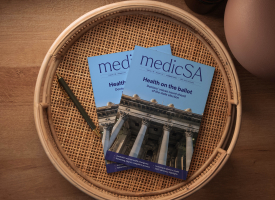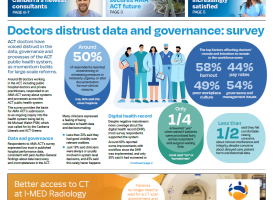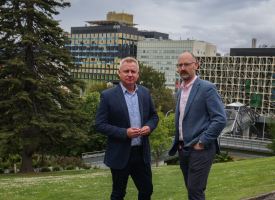AMA transcript - Government failure to deliver Primary Health 10-year-plan, also Covid 19 latest variant and flu.
Transcript: AMA President Dr Omar Khorshid on RN Breakfast, Tuesday 15 March 2022.
Subject: Government failure to deliver Primary Health 10-year-plan, also Covid-19 latest variant and flu.
HOST: PATRICIA KARVELAS: How long did you have to wait at your last visit to your GP? Over the past two years wait times have blown out, as doctors were forced to change the way they operate and deliver healthcare amid the pandemic. And the frustration is boiling over, with the Australian Medical Association launching a pre-election attack on the Coalition over delayed healthcare reforms.
Dr Omar Khorshid is the President of the AMA. Welcome to the program. Omar Khorshid, you're accusing the Government of pausing its 10-year primary health plan. What's the plan? And why do you say it's stalling?
OMAR KHORSHID: Good morning, Patricia. The 10-year primary health plan has been something that both the AMA, the College of General Practitioners, and in fact, up to 400 other groups, have all been working on with Government over the last couple of years, trying to get some direction behind reform in general practice. We have a system of general practice which is, was, built, you know, back in the early days of Medicare, in the 1980s, and it hasn't really changed much despite the fact that the needs in the community are changing, and of course, our understanding of what a good health system looks like is also changing.
So we've been strongly behind reform, we've seen a draft paper that is supposed to be coming out. But as we come closer to the election, what we're hearing from Government is, no, we're not going to be implementing this reform; there's no more money for health. And even the modest amount of money already in the budget over the last couple of years, promised at the last election - which is about $440 million dollars - sounds like a lot. But actually, you spread over the entire country it's a tiny amount of money. But it's what's needed just to implement these reforms. And even that is a step too far for the Government at the moment.
PATRICIA KARVELAS: So, give me a couple of examples of the reforms that you think are key and necessary, that the Government's not proceeding with.
OMAR KHORSHID: So, the key reform right at the centre of his plan is something called voluntary patient enrolment, or it'll be branded as My GP. And what that is, is a, I guess, almost a back to the future. It's going back to a system where you have your own GP, but of course, recognising all the modern technologies and things that allow that. So, you'll be able to - it's your choice - but you'll be able to say to a GP, you're going to be my main GP and we'll form a relationship. And part of that relationship will be access to Telehealth, it will be access to chronic disease management plans, and things that allow you to, I guess, manage the realities that are out there in general practice.
It's not- you don't turn up to the GP with one problem and then, you know, you got your six minutes and you're out. You know, the reality is that people have many complex conditions that need, I guess, different types of health care. Not just delivered by the GP. This plan also allows GPs to employ more nurses, pharmacists, dietitians, you know, physios - people within a multidisciplinary practice that can help Australians manage their conditions out in the community, rather than having to go to a- either to a public hospital or access some other type of care through their private health insurance.
PATRICIA KARVELAS: Well, the Government argues it's going to release its health plan in the next fortnight before the budget. Why are you so sure the 10-year plan has been dumped?
OMAR KHORSHID: Well, what we've been told by Government is: there is no more money. Even the money they've already promised and that they already put in their budgets for this exact reform, we are told, is no longer available. And that means that the plan will not get the support of GP's. You cannot put in a big reform without money behind it.
And then the last budget, they even put in $50 million for the computer system to bring in this reform. So, we were pretty confident it was coming, and you know, the messages we've been hearing with the Government are very disappointing. But there is still that opportunity…
PATRICIA KARVELAS: [Interrupts] So, you're saying you have the 50 million for the computer system, but you don't have the follow-up money to actually do the thing?
OMAR KHORSHID: Well, it's- it was promised, as I said, in the 2020 budget, it was promised at the last election. It just hasn't been spent, and we've been told this plan is not coming out. Now, if it does come out, and if it is funded in the budget, well that'll be, I guess, the Government's last opportunity to get some credibility with GPs. Because having talked the talk over the last couple of years, it's time for them to actually put out the actual plan. They don't even have to implement the reform - there's no time to do that. But they're even worried about putting out the plan and the small amount of money that's associated with that before the election.
And that's really disappointing for GPs, and I guess that's why we're out today talking about this. Because we know that the value of health is right up the top of people's minds when it comes to the election. We know that primary care is absolutely at the core of our health system - it's the thing that actually contains costs, that improves the quality compared with other health systems around the world. But it's been neglected for too long, and we'd really like to see this plan be released and be funded in the next budget.
PATRICIA KARVELAS: Federal Health spending is on track to hit $98.7 billion this financial year, which is almost $20 billion more than before COVID-19 hit. Health now takes nearly 17 per cent of the Federal Budget. Can the budget afford more spending like this?
OMAR KHORSHID: The budget can afford more spending like this because, you know, we don't see COVID spending as spending on the health system - it isn't. COVID spending is spending on keeping Australians alive during a global pandemic. And we've certainly welcomed the very large investments that the Government have made, not just in health care, but throughout the economy during the pandemic.
But what it hasn't delivered - other than Telehealth, we'll have to acknowledge it has delivered Telehealth - but it hasn't delivered fundamental reform of the system; it hasn't made the system any more able to cope with the extraordinary demands that we're expecting post-COVID as we face the next few years, both in public hospitals and primary care. There's no structural extra funding to cope with those needs. And we know, therefore, that Australians are going to find it harder and harder to access the health care that they need.
And that was something that parties going into the Government should not be able to get away with. You know, they need to, in order to win the election, they need to have a reasonable health policy, and they need to be open about it. At the moment, so far, we've heard little from either party on any of the health platforms. And, you know, as I said, we're even worried that- well, we've been told that the plan from last time isn't even going to implement a [audio skip] at the elections.
That's something that is just not good enough. We need to see governments looking after the health of their community through modest reforms such as the one that's been put up here. And saying that that was- that's it, health's had enough money, we're moving on to other things now, doesn't set Australia [audio skip] healthy future.
PATRICIA KARVELAS: Moving to COVID, the Omicron BA.2 variant is taking hold in Australia, with data suggesting cases in New South Wales could soon double. Do you think states are prepared to handle future outbreaks now that we're open- we're essentially nearly completely opened up?
OMAR KHORSHID: Well, I think we're just in a completely different phase now. And although BA.2 may well be [indistinct] more transmissible - we may see spikes in cases - there is that expectation that that will not lead to direct extra pressure on hospitals with highly vaccinated populations, and of course, natural immunity now that so many Australians have actually been infected with Omicron.
So, you know, if we had to go back to some form of, you know, social distancing, mandatory masks, and other measures in order to slow this, or slow another variant down, it's going to be a big blow for the community. And I think it will be- it'll take a pretty scary variant coming out somewhere around the world for us to go back to those sorts of measures.
PATRICIA KARVELAS: Colder weather is approaching. Are you worried about the crossover between the flu season and COVID?
OMAR KHORSHID: We're really worried about this winter. Not so much because, you know, COVID is a devastating virus in winter - it's probably going to have a bit of a spike in winter - but because we've got this perfect storm of a health system, as I mentioned before, that hasn't had the investment it needs over long periods of time. So it's just not big enough for every winter - let alone the winter that's coming, which will have some extra pressure from COVID - but of course, the first flu season potentially in years.
Now, we- it's really hard to predict the flu. It might not happen. But certainly there is some flu going around the world, and we haven't had it for years. And of course, our vaccination rates against the flu are likely to be lower, because everyone's just a bit sick of hearing about vaccinations, to be frank. And that's worrying for us. So certainly we're pleased to hear that the Federal Government is thinking about that and giving a little bit of extra short-term funding to the states to help them manage.
But it's, of course, critical too that Australians get out and do the right thing for their own health and for the health of the community, and strongly consider a flu vaccine in addition to their already excellent efforts, I guess, in preparing and protecting themselves against COVID. Because the flu is probably, you know, pretty similar in severity to Omicron. It is- we've now got to a point where, as a vaccinated community, the impact of Omicron is similar to the flu. It might be a bit worse, but it's not ten times worse like it was before we were all vaccinated.
And we just have to understand that if we get this wrong, if we get a big flu, it'll make it the same time as a COVID epidemic. Some people might have both diseases at the same time. We're going to see that pressure on hospitals - the ambulances ramped outside the front, and yet more people waiting longer and longer for their elective surgery.
PATRICIA KARVELAS: Dr Khorshid, thank you for your time this morning.
OMAR KHORSHID: Cheers, Patricia.
PATRICIA KARVELAS: Dr Omar Khorshid is the President of the Australian Medical Association.



